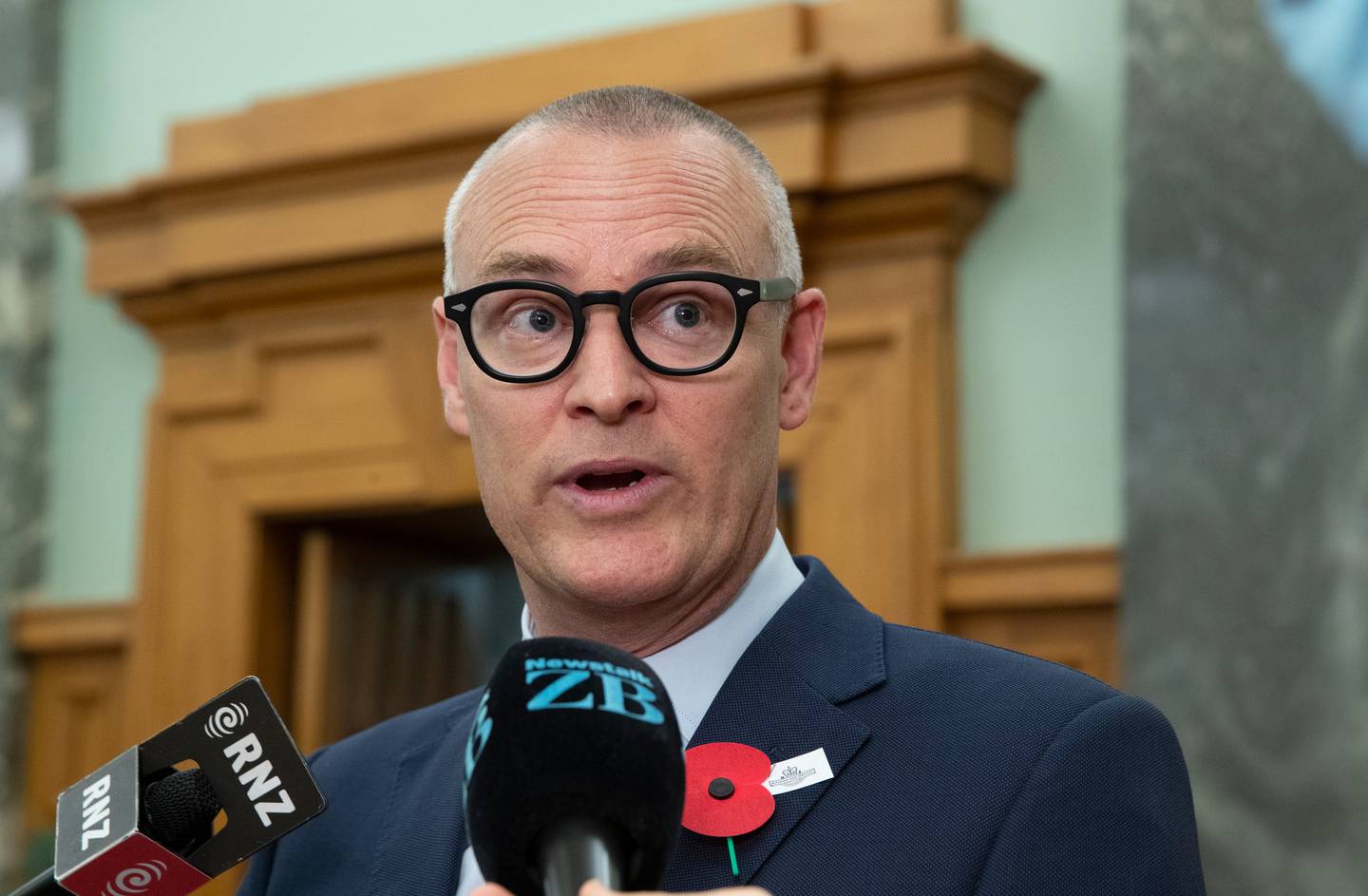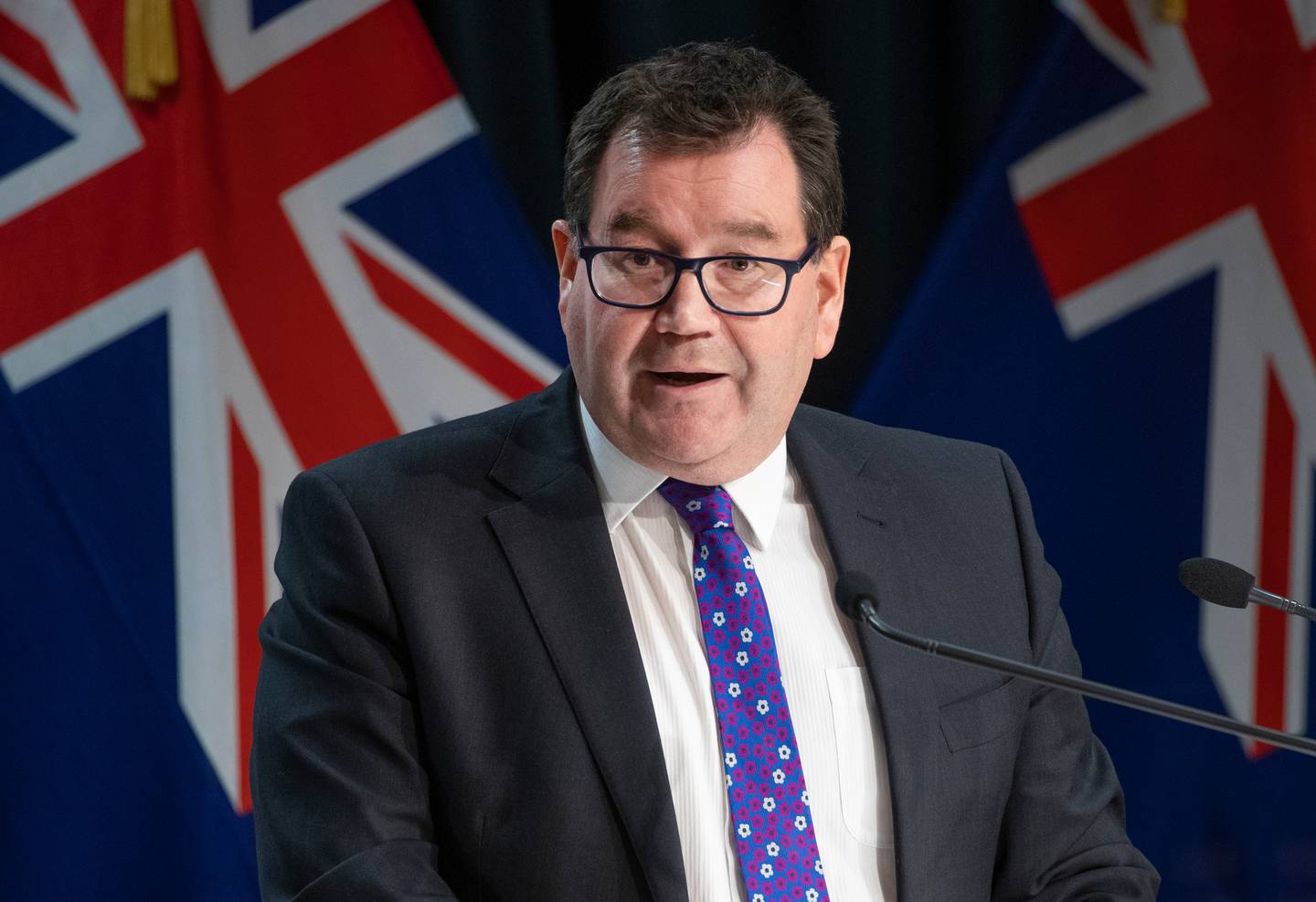The Government says it is acting on a lack of competition in the supermarket sector and warned it to change "at pace" or face regulation.
Commerce and Consumer Affairs Minister David Clark today revealed the Government's response to the Commerce Commission's market study into supermarkets, published in March.
The Commission estimated Countdown and Foodstuffs' were making excess profits of about $430 million a year – more than $1 million a day.
As the political battle over the cost-of-living crisis has raged on, the Government said that it reserved to go further than the Commerce Commission's recommendations if it saw the need.
The Commission made 14 recommendations including introducing a mandatory code of conduct, establishing an industry regulator and ensuring loyalty programmes were easy to understand and transparent.

"The Government and New Zealanders have been very clear that the supermarket industry doesn't work," says Commerce and Consumer Affairs Minister David Clark. Photo / Mark Mitchell
Clark said the Government had accepted 12 of the recommendations, adding the Government was putting the supermarket sector of "on notice".
"The two recommendations not accepted relate to implementing a voluntary wholesale access regime and to a review of competition in three years," he said.
"These issues can't be kicked down the road. We need to address the underlying drivers of the lack of competition now."
Clark said the supermarkets were making the "right noises".
"I spoke with both supermarket companies this afternoon to make this very clear. They know what is expected from them and the length of time we are prepared to give them to change before regulation kicks in."
Clark said inflation and rising cost of living made these issues more urgent. "Posturing" around prices recently by supermarkets showed they knew they were in the spotlight, but didn't fix the "systemic problem", he said.
"Which is a lack of genuine competition in the sector.
"Alongside the retail stores, supermarkets have wholesale arms.
"We are calling on the duopoly to open these up to would-be competitors, at a fair price."
Clark warned a "regulatory backstop" would be in place by the end of the year.
"If supermarkets do not strike good-faith wholesale deals with their competitors – our regulatory measures will make it happen for them. We are not afraid to unlock the stockroom door to ensure a competitive market."
Clark said if competitors did not have proper access to wholesale goods, there was no real incentive to enter the market.
"You can't run supermarkets with empty shelves. And the New Zealand market clearly needs more competition."
The Government was also looking at how to implement compulsory unit pricing on grocery products which would give shoppers the ability to better compare products and a code of conduct.
"Whilst we work to establish an industry regulator the Commerce Commission will take on these responsibilities temporarily," Clark said.
"Once established the 'watchdog' will help keep pressure on the grocery sector, by providing annual state-of-competition reviews to keep supermarkets honest, as opposed to the check-in after three years recommended by the Commission.
"It will also facilitate a resolution scheme to mediate disputes between suppliers and retailers."
Other work included legislation to ban supermarkets from using restrictive covenants on land, and leases to block competition from setting up shop in certain suburbs and shopping centres.
Clark said he would engage with the industry ahead of introducing the Grocery Industry Competition Bill to the House this year.
MBIE was also looking at requiring major grocery retailers to divest some of their stores or retail banners, he said.
Speaking at this afternoon's Post-Cabinet press conference, Clark said recent voluntary price rollbacks indicated supermarkets knew the tide was turning.
Clark said some prices were already being lowered by the duopoly in response to the findings from the Commerce Commission and demand from consumers for better prices.
On prices still being very high, he said some of that was beyond the grocery sector's control and noted the Government's cost of living payment announced in the latest Budget.
The mandatory access regime would be finalised by the end of the year, he said.
On the cost of the changes, he said none of these things had significant costs attached to them.
More work would be done to understand costs to the industry, he said.
On Kiwis struggling right now, Clark said these changes would make a difference for Kiwis, adding having bigger players enter Australia changed the landscape there.
The announcement came at this week's post-Cabinet press conference, fronted by Acting Prime Minister Grant Robertson, who is standing in for Prime Minister Jacinda Ardern who is travelling in the United States.
Robertson said the market study delivered what they knew to be true – competition was not working and change was needed.
Robertson said the wider sector was taking notice and the emergence of more options was being seen, such as The Warehouse stocking grocery products and Costco setting up shop.
"We need to address the underlying drivers of lack of competition now."
Whatever small costs the Government had to pay in the meantime paled in comparison to the benefits, Robertson said.
Robertson said the duopoly had had a long term hold over prices.
Competitors were also recognising there was now room in New Zealand for them, and they would be able to access land, Robertson said.
Robertson said none of the things such as the rollbacks were happening before the Commerce Commission's market study.

Deputy Prime Minister Grant Robertson will front the Government's post-Cabinet press conference. Photo / Mark Mitchell
Meanwhile, Monday marks the beginning of another sitting week in Parliament. It is the first sitting week since the Budget was delivered a fortnight ago.
The Budget announced $5.9 billion in new spending, plus a $1b cost of living package which mainly went towards paying for $350 payments to more than $2m people. Robertson said the package showed a "balanced approach," but his opposite number, National Finance Spokeswoman Nicola Willis has accused the Government of "band aid economics".
Robertson shot back at National over the weekend after National Leader Christopher Luxon told a National meeting, "The cost-of-living crisis – that's how we'll win this election".
Robertson had the comments worked into a Labour party election ad. He said the comments showed "global inflation is all just a political game to National".
"It's not a game Christopher, it's people's lives," he said.
The spat over inflation rumbled through the post-Budget recess week, in which the Reserve Bank raised the Official Cash Rate.
Higher mortgage rates, combined with already high house prices now mean it is more difficult for a first home buyer to service an average mortgage than at any time since the last days of the Clark Government, 14 years ago, when the OCR rose above 8.
National's Housing spokesman Chris Bishop released a statement on Sunday morning saying the Reserve Bank's most recent Monetary Policy Statement "will make for chilling reading for mortgage holders, with the central bank predicting the interest rate on one and two-year mortgages will hit 6 per cent next year".
"This will mean a major hit for Kiwi budgets. A household that has borrowed $700,000 would face annual interest costs of $42,000, meaning they would have to pay more than $800 a week before they even begin to reduce the actual loan," Bishop said.
"The pressure will be especially great for those who have recently entered the property market, with the Reserve Bank acknowledging that many first-time buyers from 2021 will find it difficult to pay their mortgages and cover their other expenses," he said.
Take your Radio, Podcasts and Music with you









